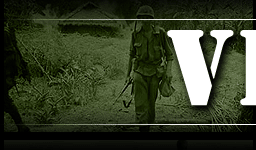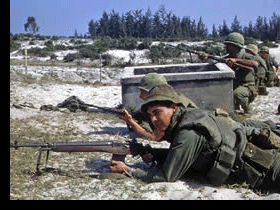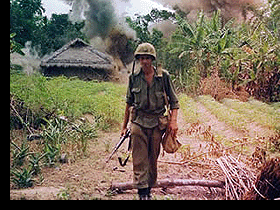


BACKGROUND
 Background on Restonia
Background on Restonia
Restonia is a third-world country that has been ruled for decades by Jenistan, one of America's longtime allies. When Restonia revolted under a leader claiming to be a nationalist, but who had previously been associated with communist leaders, Jenistan asked for the U.S.'s military support in crushing the rebellion.
Due to conflicts in Afghanistan and Iraq, the United States’ thinly spread military is not adequate to fight another war. The President is not sure if the U.S. should step in and help Jenistan or stay out of the conflict. Because the situation resembles that of the Vietnam War, the President’s advisors are researching that conflict to inform America’s approach to this new development.
Background on the Vietnam War
At the Geneva Conference of 1954, Vietnam was temporarily split into the Democratic Republic of Vietnam in the north, led by Ho Chi Min, and South Vietnam, ruled by Ngo Dinh Diem. Elections to reunify the divided country were slated for 1956, but Diem opposed the elections, which were never held.
Although President Dwight D. Eisenhower’s administration was not against Vietnamese unification, it operated under the Domino Theory, which maintained that if South Vietnam fell to communist forces, then all of Southeast Asia would become communist.
Military Strategy
 Corruption, fear, and politics among the South Vietnamese hindered their ability to defend themselves against guerrilla attacks by communist supporters. The U.S. offered support to train and supply the South Vietnamese, and under President John F. Kennedy, the U.S. increased its involvement, providing helicopters and sending the Green Berets to aid the South Vietnamese’ efforts.
Corruption, fear, and politics among the South Vietnamese hindered their ability to defend themselves against guerrilla attacks by communist supporters. The U.S. offered support to train and supply the South Vietnamese, and under President John F. Kennedy, the U.S. increased its involvement, providing helicopters and sending the Green Berets to aid the South Vietnamese’ efforts.
After Diem was overthrown by a coup, frustration with South Vietnam continued to mount. In 1964, President Lyndon B. Johnson claimed that the Gulf of Tokin Incident was an act of war against the U.S., which prompted the U.S. to take a more active role in engaging the North Vietnamese.
The United States’ policies in dealing with the enemy and the people it was trying to protect have been harshly criticized. The U.S. moved South Vietnamese off their ancestral lands to poorly built hamlets so they would be safe from the North Vietnamese. The villagers resented having to move as well as the fact that Johnson's bombing campaign destroyed their lands and homes along with a lot of innocent lives. Rather than win over the South Vietnamese people, the U.S. angered and alienated them.
In the meantime, General William C. Westmoreland, the American general who commanded U.S. forces in Vietnam, called for an escalation of the war and predicted victory by 1967. To fight a war of attrition, Westmoreland continued to ask for more troops, but the North Vietnamese outnumbered the U.S. military. As cost and bodies added up, the pressure back home was mounting.
Despite the U.S. military’s claims that the end of the war was in sight, the North Vietnamese were able to storm the capital of South Vietnam and other major cities in 1968 during what was called the Tet Offensive. Although the South Vietnamese responded effectively to the urban offensive, the American public was shocked.
Public Opinion and Politics
News of the number of dying and the draft did not help the opinion polls. The war was becoming unpopular, and the Tet Offensive was proof that the military strategies were not as successful as Westmoreland had claimed. Many members of Congress felt misled by President Johnson and believed that he had lied to them about the Tokin Incident. They had given him a blank check with which to fight the war, and they felt misled and used.
The U.S. media became increasingly critical of the Johnson Administration’s credibility. Public support for the war waned, and Americans increasingly favored a U.S. withdrawal from Vietnam. The tremendous loss of life during the Korean War was on everyone’s mind. The fear of a Communist Domino Effect was not enough to convince the public that the U.S. should remain in Vietnam.